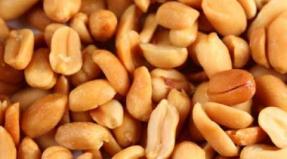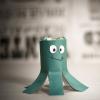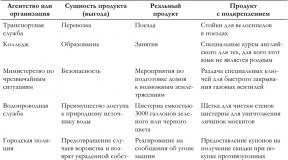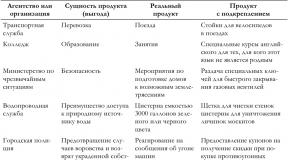How long does it take for alcohol to come out of milk? Can I drink alcohol while breastfeeding? Rules for "safe" use. How to get rid of alcohol faster for a nursing mom
A nursing mother, taking care of the health of her baby, always carefully monitors what she eats, drinks, what medications she takes. Sometimes she does it intuitively, and sometimes she relies on the recommendations of doctors. However, there are situations in which even an experienced mother does not know what to do.
One of those moments is alcohol while breastfeeding. Lack of unambiguous information, together with common misconceptions, leads to the fact that the nursing mom makes mistakes. We will talk about the effect of alcoholic beverages on breast milk and baby's health in this article.
No matter how harsh it sounds, but a woman and alcohol - incompatible concepts... Numerous scientific studies carried out in various countries of the world have shown that ethyl alcohol, which is part of any intoxicating drink, is a powerful neurotropic poison. In other words, it is a substance that kills nerve cells.
Ethanol is especially dangerous for pregnant women; it easily penetrates the fetus through the placenta, causing it to have defects that are incompatible with life or leading to severe disability. Children born to mothers who abused alcohol while pregnant have a lower level of mental and intellectual development.
These facts should be enough for a woman, in whatever position she was, to unequivocally say “no” to alcohol.
Breastfeeding and strong drinks
Until now, unfortunately, no large domestic studies have been conducted on the penetration of alcohol into breast milk and its effect on the baby. The works of foreign scientists are not always in free access and most often are not represented in translation.
Therefore, nursing mothers who seek to find reliable information very often find themselves in difficulty. The intensity of passions is added by a way of increasing lactation common among the older generation - with the help of "live" beer and the opinion that the baby becomes calm if he is fed with breast milk from a mother who has allowed herself a couple of glasses of wine.
What effect does alcohol actually have when breastfeeding? Below we will provide reliable facts, and each mommy will decide for herself what to do.

Alcohol in breast milk: circulation features
It has been scientifically proven that alcohol penetrates into breast milk, and its concentration in it corresponds to the approximate concentration of ethyl alcohol in the blood. Its maximum content in milk is found 0.5-1 hour after consumption on an empty stomach and after 1-1.5 hours if the intoxicating drink was taken after eating.
Complete cleansing of breast milk from traces of alcohol occurs simultaneously with cleansing blood from it, and its speed depends on the woman's body weight. The more mommy weighs, the faster alcohol will be removed from her blood and breast milk.
For the convenience of calculations, the international scientific community has adopted a system of "drinks". One "drink" \u003d 15 ml of pure ethyl alcohol.
The table shows the ratio between the most common alcoholic beverages and 1 drink.

That is, 1 drink is equal to 1 shot of vodka, 1 glass of table wine or 1 mug of beer.
Depending on how many servings the woman drank (the number of drinks per hour) and her body weight, it is possible to calculate how long the blood and breast milk will be completely cleansed of the presence of alcohol. The calculation results are presented in the table.

For example, if a woman weighing 59 kg drinks one glass of beer, then her milk will become completely safe for the baby in 2 hours and 24 minutes. But if mommy has 83.9 kg, her body will process the same amount of ethyl alcohol in 1 hour and 59 minutes.
Expression does not affect the rate at which alcohol is “cleared” from breast milk. Milk that replaces expressed milk will have the same ethanol concentration until its level drops in the blood itself.
The effect of alcohol in mother's milk on the baby
As we said before, ethyl alcohol is the strongest poison, and its effect is manifested even at low concentrations. If a nursing mother consumes strong drinks every day, for example, drinks a bottle of beer in the evenings, and, without waiting for the "cleansing period", breastfeeds the baby, then the level of ethanol is enough to cause him to delay motor development and poor weight gain.
If the mother is very drunk and breastfeeds the baby in this state, this will cause the baby to sleep deeply, lethargy, lethargy, decreased reflexes, and constipation.
Alcohol while breastfeeding inhibits milk production, which further leads to underweight and developmental delays. Thus, the statement that beer stimulates lactation, not true.
Ethyl alcohol in breast milk leads to the development of the effect of "dependence" in the baby, it is often applied to the breast, but sluggishly and sucks little.
The rate at which alcohol is removed from the child's body directly depends on his age: the younger the baby, the more time it takes. In addition, newborn babies do not have a sufficiently developed system for neutralizing ethanol in the liver, therefore they are at greater risk than babies older than 3 months.

How to reduce the risk?
If, in spite of everything, the nursing mother still decided to drink an alcoholic drink, then there are several tricks that will help to avoid adverse consequences for the baby.
Alcohol begins to be absorbed into the bloodstream already in the oral cavity, most of the ethanol is broken down in the gastrointestinal tract, 5-10 minutes after drinking the first dose of alcohol, ethanol can be found in the blood.
On average, the absorption phase lasts 40–80 minutes, the speed is influenced by various processes in the body, in women the process of assimilation of alcohol is faster than in men. After 5 hours, the decay process begins, which becomes the cause of the appearance of bad breath.
The maximum concentration of ethanol is observed about an hour after taking the first dose of alcohol, then begins to gradually decrease.
What determines the rate of ethanol elimination:
- the functional state of the liver, kidneys, sweat glands, bladder - in the presence of pathologies, the splitting process slows down;
- body weight - a thin person gets drunk faster and sober up more slowly than well-fed people;
- age - in elderly people, the body is worn out, there are many chronic diseases, therefore, their intoxication does not go away for a long time, but in adolescents the process of removing toxic substances is slowed down;
- the amount of liquid drunk - if a person, after drinking alcohol, drinks more water, visits the toilet often, then the body will cope with the detoxification process faster;
- the quality and composition of the product, the dose of the drink;
- against the background of stress, emotional overload, alcohol is excreted faster;
- when drinking alcohol on an empty stomach, intoxication occurs faster.
On average, the concentration of ethanol in the blood in men decreases by 0.1-0.15 ppm hourly, in women - 20% slower.
Of blood
The maximum concentration of ethanol in the blood is observed immediately after drinking alcohol, after 2 hours the indicators will equal the level of alcohol in the urine, and after 3 hours only insignificant residues of alcohol will remain in the blood.
According to the legislation of the Russian Federation, when checking drivers with a breathalyzer, the indicators should be no more than 0.16 ppm in exhaled air, and no more than 0.35 ppm in blood.
C \u003d A / m × r, where C is the concentration of ethanol, A is the amount of alcohol consumed (g), m is body weight (kg), r is the Widmark coefficient, for women is 0.6, for men the value is 0.7 ...
From breast milk
Alcohol leaves the body through the lungs, kidneys, pores on the surface of the skin and mammary glands, therefore, it is strictly forbidden for nursing women to drink alcohol.
Alcohol is removed from breast milk in different ways, it all depends on the woman's age and weight, quantity, quality and strength of the product.
Rate of neutralization of ethanol in breast milk (hours: minutes)
| Weight, kg) | 1 serving | 2 servings | 3 servings | 4 servings | 5 servings |
| 40–50 | 2:40–2:50 | 5:10–5:40 | 7:50–8:30 | 10:20–11:20 | 13:00–14:10 |
| 50–60 | 2:20–2:30 | 4:50–5:10 | 7:10–7:40 | 9:40–10:40 | 12:00–12:50 |
| 60–70 | 2:10–2:20 | 4:20–4:40 | 6:35–7:05 | 8:50–9:30 | 11:00–11:50 |
| 70–80 | 2:00–2:10 | 4:00–4:20 | 6:00–6:30 | 8:10–8:40 | 10:10–10:50 |
| More than 80 | 1:50–2:00 | 3:40–4:00 | 5:30–6:05 | 9:15–10:10 | 11610–12:10 |
What is the dose of alcohol:
- a glass of champagne and wine (11-13%) - 100 ml;
- fortified wines - 60 ml;
- beer (more than 2.7%) - 280 ml;
- light beer (up to 2.7%) - 420 ml;
- a glass of strong alcohol - 30 ml.
The decrease in alcohol concentration is directly proportional to the amount of alcohol consumed - the more alcohol is drunk, the slower the alcohol is removed from the body.
From urine
Drinking alcohol is harmful to the health of the nursing mother and baby. And if a woman suffers from alcoholism, the only way to protect the baby is to completely give up alcohol. Even the smallest doses of alcohol are out of the question. After drinking very little beer or wine, a woman will not be able to stop.
Some moms at breastfeeding do not deny themselves the pleasure of drinking a glass of their favorite wine at a family celebration or other event. And they are also interested in how long it takes to get alcohol into the milk and when it can feed the baby.
If you drank a little of a weak drink and at the same time ate well, then after 30-40 minutes the alcohol will be in your breast milk. That is, you can feed the baby within 20-25 minutes.
Some mothers try to express milk to reduce their alcohol concentration. But this is completely useless, since until ethanol is removed from the blood, it will be contained in milk.
After absorption into the blood, alcohol gradually decreases its concentration for 2 hours, but this is provided that a little was drunk and the continuation of the banquet does not follow. So how long can you feed your baby? If you have drunk a glass of beer or a glass of wine in three hours, you can feed your baby.
- Strength of the drink and its amount. Naturally, the more was drunk, the longer ethanol stays in the body.
- Mother's age. In young women, metabolic processes occur faster, respectively, and the breakdown of alcohol.
- Body mass. It is worth remembering that in small fragile women, the absorption of alcohol into the blood is much faster.
- Health status. Many chronic diseases can affect how much ethanol is contained and excreted in breast milk.
Alcohol passes into breast milk as the concentration rises in the blood.
| Mother's weight | The time of the release of alcohol |
| 40 Kg | 2 h 50 min |
| 45 Kg | 2 h 42 min |
| 50 Kg | 2 h 36 min |
| 55 kg | 2 h 30 min |
| 60 Kg | 2 h 24 min |
| 65 Kg | 2 h 16 min |
| 70 kg | 2 h 12 min |
| 75 kg | 2 h 08 mins |
| 80 Kg | 2 h 03 min |
| 85 kg | 1 h 58 mins |
| 90 kg | 1 h 54 min |
| 95 Kg | 1 h 51 min |
This table considers the ratio of one glass of wine, the volume of which is 150 ml, and the alcohol content is not more than 11%, or a mug of beer is about 350 ml with an ethanol content of not more than 5%.
If we talk about stronger drinks - vodka or cognac, then in the above example, the use of 42 grams of a 40% substance. Having considered a detailed table on the elimination of alcohol from milk, one can understand that a lot depends on the mother's body weight.
Allergens
Their entry into milk begins in 40-50 minutes. It can last from 3 to 15 hours, depending on the rate of digestion of the product containing the allergen: for dairy products it will be 3-4 hours, for flour products - 12-15 hours, for vegetables from 6 to 8 hours.
Harmful e-supplements, which are abundant in modern supermarket food, can enter blood milk for up to 1 week.
Allergens trigger the release of histamine and can trigger rashes in a child. The most common allergies are honey, eggs, citrus fruits, red vegetables and fruits, seafood, nuts, whole cow's milk.
If the allergy manifests itself in a moderate degree, then the crumb can be gradually accustomed to the allergenic product, using it in small doses and infrequently.
There are also products that should be completely abandoned. Glutamates, which are found in industrially produced chips and crackers.
Synthetic vitamin complexes, herbal extracts. Nitrates.
They are found in large quantities in vegetables and fruits of an unnaturally beautiful appearance. Aspirin.
It is added, for example, to lemonade. It is strictly prohibited for use by lactating women and children.
The effects of alcohol on the body
If mom is still thinking about whether to drink while breastfeeding, we suggest that you familiarize yourself with the most dangerous and common consequences of alcohol intake.
The abuse of such drinks leads to negative consequences, no matter what percentage goes into the child's diet:
- Neurological disorders, developmental retardation, tearfulness, lack of sleep, exhaustion of the nervous system;
- Disturbances in work of cardio-vascular system, increased heart rate and decreased blood pressure;
- Lowering the lactation level, many believe that beer speeds up the process of milk production, however, this is a myth, although the breasts become larger;
- Alcohol enters breast milk through the blood, so toxins easily affect brain cells, the result is developmental delay;
- Drinking alcohol negatively affects the child's immune system, weakening it;
- Disorders in the digestive tract, allergies are possible, the skin becomes pale.
Analyzes show that the baby of a constantly drinking mother is in poor health, more often suffers from chronic diseases and mental retardationit also affects the work of the heart.
To remove all toxic substances, it is required to normalize nutrition and completely exclude alcohol-containing components from the diet.
Myths and truths about alcohol during lactation
This is an eternal topic that interests every mother, consider the most popular misconceptions:
- Beer, it helps to increase the flow of milk. This is not the case, alcohol, on the contrary, inhibits this process.
- Wine promotes good sleep for your baby. This is an erroneous opinion, the child has a violation of rest, he often wakes up, although he falls asleep faster. Of course, if you drink one glass a day, then it will not lead to such disorders.
- Non-alcoholic drinks are completely harmless. It is important to understand that even they have a minimal ethanol content.
- Increase in milk volume due to alcohol. Experts conducted comparative studies that showed the level of milk excreted over a certain period of time with and without alcohol. Calculations have shown that in the first variant it is much less.
- Altered milk taste due to alcohol. It depends on what percentage of alcohol has entered the mother's breast milk, if the amount drunk is much higher than the norm, then the taste will be unpleasant for the baby.
- Expressing milk after alcohol helps to remove harmful substances their food. This is a myth, you need to wait a certain amount of time until the body is completely rid of toxic elements, so it is better to express food before drinking alcohol.
- Feeding with strong intoxication is much more effective. This is a common misconception that toxins, on the contrary, make it difficult to express milk, which impairs the baby's nutrition.
- Alcohol builds up in milk. This is a myth, decay products come out and are processed completely after a certain time, about a day later.
To protect the baby from the influence of food unacceptable for GV, mothers can find out the time of complete elimination of traces of products from the blood and express "in the sink", and then wait for a new portion of milk and feed the baby with a safe lactation product.
Knowledge of the period of "assimilation" of products is also necessary in order to use their positive properties with HS and provide feasible "help" to the crumbs with beets for constipation, and with starchy food - with a slight tendency to diarrhea.
No matter how much a woman drank, it is worthwhile to understand that ethanol is a very dangerous toxin, especially for an unformed body. Some recommendations should be followed:
- Forget about alcohol until the baby is three months old;
- Feed in advance and express "clean" food;
- Drink weak drinks;
- Drink only high quality alcohol.
The opinion of Dr. Komarovsky
Dr. Komarovsky is a well-known pediatrician who has earned the trust of many mothers. He also notes that a glass of good wine a day is practically harmless to the child's body. Komarovsky gives examples of how to protect a baby from ethanol getting into his body:
- You can speed up the exit by inducing vomiting;
- Drinking coffee brings you back to normal nervous system and the state of the brain;
- You can drink chicory.
It is imperative that before feeding, you need to neutralize the content of toxins; in case of severe poisoning of the body, it is better to seek help from a doctor.
Breast milk is the healthiest food for a newborn. It is well absorbed and has the following beneficial effects on the child's body:
- provides good mental and physical development;
- strengthens the immune system;
- protects against various diseases;
- eases the condition during the eruption of the first teeth.
It gives such an effect due to its composition:
- amino acids;
- fats;
- carbohydrates;
- trace elements;
- vitamins;
- immune proteins;
- leukocytes.
Breast milk is at the optimum temperature for lactation and is completely sterile. Feeding the baby can be done anytime, anywhere. In addition, it establishes close contact between mother and baby, as well as forms the correct bite. Therefore, breastfeeding is recommended as long as possible (at least up to one year of age).
Does alcohol pass into breast milk?
Alcohol penetrates with the bloodstream into all organs and systems. Hormonal disbalance leads to disturbances in the functioning of the liver and metabolism. Because of this, ethanol spreads very quickly and takes a long time to erode.
If a woman has consumed a glass of wine or champagne, alcohol enters breast milk within half an hour. The alcohol concentration is 10% and may vary. In case of metabolic disorders, it increases to 20%.
Why is alcohol dangerous?
During lactation, the hormones oxytocin and prolactin are produced. The first substance is responsible for transporting milk to the nipple, and the second for its production. If even a minimal percentage of any alcohol enters the body, the level of one element decreases, and the other increases. As a result, there is a lot of food, and the baby cannot suckle it normally.
The first six months after birth, the child feeds only on mother's milk. His liver is still so small that he cannot metabolize even a drop of ethanol. Therefore, during lactation, you need to completely abandon alcohol products.
Ethanol does not accumulate in the chest. The child will receive exactly the amount of cognac, beer, etc. that was consumed.
Alcohol changes the taste and smell of milk, so the baby may refuse to feed naturally.
Alcohol removal table from breast milk
Time table of elimination of alcohol from breast milk:
| Mother's body weight, kg | The volume of alcohol taken, in drinks (1 drink is equal to 350 ml of light beer, 150 ml of wine, 50 ml of spirits) | ||||
| 1 | 2 | 3 | 4 | 5 | |
| 40 | 2:50 | 5:40 | 8:30 | 11:20 | 14:10 |
| 41 | 2:46 | 5:32 | 8:19 | 11:05 | 13:52 |
| 45 | 2:42 | 5:25 | 8:08 | 10:51 | 13:34 |
| 47 | 2:39 | 5:19 | 7:58 | 10:38 | 13:18 |
| 50 | 2:36 | 5:12 | 7:49 | 10:25 | 13:01 |
| 52 | 2:33 | 5:06 | 7:39 | 10:12 | 12:46 |
| 54 | 2:30 | 5:00 | 7:30 | 10:00 | 12:31 |
| 56 | 2:27 | 4:54 | 7:22 | 9:49 | 12:16 |
| 59 | 2:24 | 4:49 | 7:13 | 9:38 | 12:03 |
| 61 | 2:21 | 4:43 | 7:05 | 9:27 | 11:49 |
| 63 | 2:19 | 4:38 | 6:58 | 9:17 | 11:37 |
| 65 | 2:16 | 4:33 | 6:50 | 9:07 | 11:24 |
| 68 | 2:14 | 4:29 | 6:43 | 8:58 | 11:12 |
| 70 | 2:12 | 4:24 | 6:36 | 8:48 | 11:01 |
| 72 | 2:10 | 4:20 | 6:30 | 8:40 | 10:50 |
| 74 | 2:07 | 4:15 | 6:23 | 8:31 | 10:39 |
| 77 | 2:05 | 4:11 | 6:17 | 8:23 | 10:28 |
| 79 | 2:03 | 4:07 | 6:11 | 8:14 | 10:18 |
| 81 | 2:01 | 4:03 | 6:05 | 8:07 | 10:08 |
| 83 | 1:59 | 3:59 | 5:59 | 7:59 | 9:59 |
| 86 | 1:58 | 3:56 | 5:54 | 7:52 | 9:50 |
| 88 | 1:56 | 3:52 | 5:48 | 7:44 | 9:41 |
| 90 | 1:54 | 3:49 | 5:43 | 7:38 | 9:32 |
| 93 | 1:52 | 3:45 | 5:38 | 7:31 | 9:24 |
| 95 | 1:51 | 3:42 | 5:33 | 7:24 | 9:16 |
Alcohol is excreted from breast milk for a long time (this can happen even after a day). If you drink more than the specified dose, ethanol will disappear even longer.
Naturally, a newborn cannot remain without food for so long. Therefore, during lactation, it is important to calculate the dose used and know how much it lasts, so as not to cause serious consequences.
It is better to completely refuse to take alcoholic beverages.
Experts do not recommend a nursing mother to consume vodka and other alcoholic beverages. This will reflect badly on the child. Also, it is necessary to exclude coffee, chicory, seafood, citrus fruits and others from the diet, which can cause allergies in the baby.
Dr. Komarovsky believes that beer can be drunk by a nursing mother. It contains vitamins, malt, yeast. But in the drink you need to know when to stop. It is better to purchase products in a bottle than in a can and give preference to the non-alcoholic option.
If a woman cannot refuse alcohol, then at least she must follow the rules for its use during lactation:
- The negative effect of ethanol on a child depends on how much of the substance has entered his diet. A little red semi-sweet wine is acceptable, but strong alcohol should be completely abandoned. Its withdrawal takes a long time, and it can provoke severe intoxication. It can be determined by nausea, vomiting, pale skin, etc.
- The first three months after the birth of a child, you need to completely abandon alcohol and adhere to proper nutrition... So it will turn out to save the newborn from disastrous consequences.
- When drinking alcohol, you need to calculate your weight. In thin women, ethanol enters milk quickly, and its decomposition takes a long time.
- You cannot drink on an empty stomach.
- It is forbidden to drink alcohol in large quantities. This will lead to severe poisoning not only of the woman herself, but also of the baby. In addition, in a drunken state, the mother is not able to control her behavior. This can lead to the death of the baby.
The analyzes carried out have shown that ethanol will be released approximately as much as indicated in the table.
Expressing will not speed up the release of ethanol from the body.
After how many hours can you feed?
It is recommended to feed the child after drinking alcohol no earlier than 3-4 hours later. To minimize harm, you need to follow these tips:
- before drinking alcohol, it is good to feed the baby in order to increase the time until the next lactation;
- use as little products with a degree as possible;
- strain several portions in advance so that, if necessary, feed the baby;
- if a lot of milk is formed during the feast, it can be expressed and poured out to relieve the woman's condition.
Check out the ethanol withdrawal chart before the celebration. This will help in determining the amount of milk to prepare in advance.
Myths and reality
Myths about alcohol during lactation:
- "Beer increases the amount of milk" - ethanol sometimes increases the number of feedings (the baby often asks for a breast), and decreases the concentration of nutrient fluid by 25%. Therefore, you cannot drink a drink to improve lactation.
- "Alcohol improves baby's sleep" - indeed, after a "drunken" feeding, the baby has a desire to go to sleep. However, such rest is shallow and disturbing. The baby cannot fully recover his strength. Sleep duration is getting shorter.
- "Alcohol does not affect the taste of milk" is a big misconception. After drinking alcohol, the infant often refuses to breast, as the taste becomes unusual for him.
- “After expression, the milk is cleared” - ethanol cannot accumulate in the breast. With the blood flow, it enters the glands, and then returns to the vessels again. Therefore, the statement is erroneous. A large intake of liquid will not help clear milk.
- "Strong intoxication of the mother does not pose a threat to the child" - ethanol in large volumes can greatly harm the health of the baby. In addition, with a pathological condition in a woman, all reactions slow down. She cannot take proper care of the baby.
- "Alcohol relieves postpartum depression" - on the contrary, alcohol only intensifies it.
Content
Holidays are rarely complete without alcoholic drinks. They help to relax, relieve tension, create a certain mood. But any alcohol during breastfeeding, including wine, is contraindicated for mothers, since during feeding it is transmitted to the baby. The period of elimination of alcohol from the developing organism is 3-4 times longer than that of adults. During this time, ethanol molecules can harm the developing central nervous system, the digestive tract, and cause hypoglycemia.
Alcohol and breastfeeding
Research by Serge Rend has confirmed that drinking grape-based ethanol-based drinks boosts immunity, improves mood, and overall good organ function. But alcohol has the opposite effect. It penetrates into all organic fluids, into the lymph, interferes with normal lactation. Therefore, when asked whether a nursing mother can drink, 99% of doctors will answer that it is impossible. If you have drunk a couple of glasses of any alcoholic beverage, then wait for the organs to process it.
Does alcohol pass into breast milk
Alcohol enters all organs at once through the bloodstream. Young mothers, before drinking a glass of wine, should not only think about whether alcohol gets into breast milk, but also about the state of their liver. Hormone surges lead to changes in the functions of this organ and metabolism. With such violations, ethanol will quickly spread throughout the body, and leave it very slowly. Alcohol penetrates into milk after 30 minutes. The decomposition time of the substance depends on the weight and condition of the mother. If you want to take alcohol, you must adhere to the following rules:
- Remember the baby's age. Up to 3 months, a small body is too sensitive to alcohol, which can provoke poisoning.
- It is impossible to consume wine, vodka, champagne or cognac an hour before feeding, since the liver and pancreas will not have time to process them.
- Consider your own weight when consuming alcohol-containing products. The smaller it is, the longer you will have to wait for the release of ethanol from the body.
- You can drink one glass of wine, 250 ml of beer or 30 ml of cognac per day. They cannot be taken together.
What percentage passes into breast milk
Ethanol is absorbed by the female body faster, and comes out more slowly. When asked what percentage of alcohol passes into breast milk, doctors say only 10%. The percentage is subject to change. It is affected by the mother's weight and the amount of alcoholic beverages she has taken. If you have metabolic problems, the percentage increases to 20. Ethanol leaves the mammary glands easily, but it stays in the brain for a very long time, therefore, even 3 hours after drinking wine or beer, women are not recommended to drive vehicles.
How long does it take to get into milk
The time of absorption of any substances is determined by the complexion of a person and the rate of metabolic reactions. For this reason, it is impossible to answer exactly how much alcohol passes into breast milk. The approximate time is 25-40 minutes. Alcohol even 2 hours after ingestion will be passed on to the baby. Many women find that under the influence of Cahors or beer, their babies fall asleep faster. This condition cannot be attributed to proper sleep. It is caused by intoxication and intoxication when feeding with alcoholic milk.
How much alcohol is removed
The time for the decomposition of alcohol by all organic systems is on average 2-3 hours. This figure is also relevant as an answer to the question of how much alcohol is removed from breast milk. The amount of alcoholic beverage taken and the metabolic rate of a person makes its own adjustments. People with quick exchange substances ethanol will break down in less time than those with digestive problems.

Alcohol withdrawal table
Before drinking wine or champagne, many breastfeeding mothers think about how long the drinks will take. Ideally, it is believed that a healthy body will be able to remove up to 120 mg of the product in an hour. The following is a table showing the elimination of alcohol from breast milk. From it you will find out how long it takes 130 ml of various drinks containing ethanol to be excreted from the body.
|
Woman's weight in kg / Name of the drink |
|||
|
Gin and tonic 9% |
|||
|
Champagne 11% |
|||
|
Port wine 18% |
|||
Do I need to express milk
Alcohol, once in the stomach, penetrates everywhere. The main difference lies in the concentration of the substance. Only 10% of the ethanol molecules in the blood penetrate into milk. The substance is removed simultaneously from all organic systems. Therefore, when asked whether it is necessary to express milk after alcohol, doctors answer that this is not necessary. However, if you have a baby under 3 years old at home and needs to feed every 120-150 minutes, you should leave a bottle of nutrient fluid.
Expressing in order to minimize the concentration of alcohol in the blood is useless, since all organs are renewed in a certain mode. It will not work to influence him from the outside. After the time indicated in the table has passed, you can continue feeding without fear that the baby will be poisoned by ethanol molecules. For safety, you can add 1-2 hours to the alcohol removal time, and then feed the baby.

Wine while breastfeeding
During and after pregnancy, only soft drinks can be safely consumed. A glass of wine while breastfeeding will harm lactation and your baby. It will be more useful to replace it with a glass of pomegranate juice, which improves the process of blood production. If you really love this drink, then wait until your baby is 4 months old. Then white and red wine will not do much harm, even if they are in the mammary glands and blood for longer than the established 2 hours.
Breastfeeding beer
This drink does not affect milk volumes. Beer breastfeeding is contraindicated, like other alcohol-containing products. It has long been rumored that a certain amount of a mixture of hops and malt has a good effect on lactation and can help young mothers restore milk production. Research has refuted this information. Slight breast swelling after beer is observed for the following reasons:
- Ethanol retains fluid in the vessels, which leads to swelling of the lymph nodes and veins.
- The high alcohol content inside the body inhibits the production of oxytocin. This hormone is produced in mothers when the baby begins to suckle at the breast. It promotes the release of fluid from the breast. Without it, she remains in the glands, and the baby receives a smaller amount of food.

Champagne while breastfeeding
Sparkling wine is considered safe for the health of the mother. This alcohol-containing product cannot cause severe intoxication, its effect on lactation is minimal. Champagne with HS can be consumed, but the dose should not exceed 200 ml. Do not drink alcoholic beverages on an empty stomach. The average time for the body to break down champagne is 180-200 minutes. Measure this gap after drinking a glass of sparkling wine.
Video
Found a mistake in the text? Select it, press Ctrl + Enter and we'll fix it!Discuss
Alcohol while breastfeeding - how long can you feed the baby if the mother drinks alcohol
How much alcohol is eliminated from breast milk? And is it generally possible for a woman to drink alcohol during such a period? More on this later in the article. For a nursing mother, a lot is prohibited. Not all are allowed medical drugs during treatment, the menu is also limited. But it is widely believed about intoxicating drinks that they increase the amount of milk. In this article, we'll look at how true this is.
Alcohol and hangover
Any alcoholic beverage contains alcohol. It, in turn, negatively affects the nervous system and the digestive organs. The initial feeling of happiness and freedom after drinking turns into a hangover. It arises already due to the intoxication of the body. This is expressed by a headache (due to vasoconstriction), bad mood, tremor, nausea and vomiting are possible. And these are not all signs of a hangover. If you do not know the measures in the use of strong drinks, you can ruin the liver. Since alcohol affects an adult in this way, what will be the reaction of the child's body? Therefore, nursing mothers are interested in: what are the features of getting rid of the body from ethanol.
Alcohol in breast milk
Once in the body, alcohol begins to be absorbed immediately. The process begins in the oral cavity and ends in the rectum (most of it is absorbed here). Further, already through the blood, alcohol begins to "walk" throughout the body. Then he influences the work of organs. It also passes into breast milk. Approximately 25-40 minutes after taking the drink, alcohol will be present in it. On average, its concentration is 10% of the amount drunk. This has already been proven by research. It has also been confirmed that alcohol affects the taste, color and quality of milk. Each mother loves her baby and does not want to harm the baby. But it happens that the body simply requires a strong drink (after childbirth, hormonal disruptions often occur) or the long-awaited New Year's holiday has come, so you really want a sip of champagne.

Then mom needs to know how much alcohol is removed from breast milk. There is no single answer to this question. Since it affects what the woman has drunk and how much. Also important are indicators such as age, weight of the mother, health status (especially of the liver). The result is also influenced by whether she drank the drink on an empty stomach or after a meal. It is also important to know when the drink was consumed: in the morning or in the evening. Since in the evening, the body's metabolism slows down. Then alcohol will disappear longer than in the morning. But there is average data on how much alcohol is removed from breast milk, depending on weight, the amount of alcohol consumed and the type of alcoholic beverages.
Approximate calculations and table

For example, a glass of a drink was taken and a woman's weight is 60 kilograms:
- light beer is withdrawn after 40 minutes;
- cocktail after 1.5 hours;
- champagne after 2 hours;
- port after 3 hours;
- liquor after 5 hours;
- vodka after 7 hours.
The stronger the drink, the longer it stays in the body. And if a woman decided to let herself relax a little and drink alcohol, then time should be taken into account. The baby should be fed before drinking, so there will be time left to cleanse the body. If you plan to take strong drinks, it is better to express breast milk in advance. It is advisable to use the table of elimination of alcohol from breast milk (it will be presented below). But these figures are approximate. This means that they do not give completely accurate information on how much alcohol is removed from breast milk completely.
Therefore, it is better to add 30-45 minutes to the specified time. If a strong drink was drunk, then two hours can be added. And it is important to know one more factor. Expressing milk will not help as long as there is alcohol in the mother's blood. This procedure is only useful when the breasts are full and need to be expressed to avoid stagnation.

1 drink \u003d 141.75 g of 11% wine or 340 grams of 5% beer, or 42.53 g of 40% spirits.
What consequences can be expected if a child drinks "drunk" milk?

The consequences can be as follows:
- The child may experience a temporary feeling of euphoria, which will soon be replaced by anxiety. Children often experience sudden mood swings. After drinking milk containing alcohol, the child will fall asleep quickly. But the dream will be sensitive and superficial. As a result of such sleep, the child's body will not be able to recover its strength normally.
- Milk production will decrease. Usually the reduction reaches 25%. Therefore, the child often asks for food, since he will not gorge himself. And it will be harder to suck on the breast, the baby will quickly get tired. If the mother often drinks alcohol, then the baby is gaining weight poorly and lagging behind in development from peers. Alcohol also affects the milk channels. Under the influence of alcohol, they narrow. And when feeding, there are chest pains. Not every mother likes this feeling.
- If the child is not even three months old, then he has a practically defenseless body. He simply will not be able to give a normal rebuff to alcohol. Ethanol, in turn, can damage digestion (especially the liver). The child will be bothered by colic, possibly regurgitation. Milk will not be able to fully digest. Alcohol will harm the psyche and the development of brain activity. Again, a developmental lag will be seen.
- Alcohol also affects the work of the child's heart. The palpitations become more frequent, and shortness of breath may often appear. But at such a young age, the heart is not yet fully formed. And the frequent use of alcohol can spoil this organ for a child, there will be problems in the future.
- Milk changes its taste and smell. Because of this, the baby may simply give up the breast.
- If the mother drinks a glass of beer every evening, and the baby enjoys such milk, then development is possible alcohol addiction already at that age. And this means the likelihood that the child, when he grows up, will abuse alcohol.
Features of the influence of beer on milk
If we choose from all alcoholic beverages, then natural light beer is allowed. But it is natural from glass bottles (it is better to avoid tin cans) and with a low alcohol content. This product contains yeast. And they are useful for both mother and child. It's better to opt for non-alcoholic beer though. This drink is the safest.

Features of the influence of wine
Many people praise wine products. It is believed that a glass before a meal will not harm even a child. It's a lie. Wine should not be drunk by pregnant women, nursing mothers (at least until the baby is four months old) and children. If you really want to, then you can skip a glass. Although the same pomegranate juice will be much more useful and may dull the desire.
The influence of champagne
With regard to this drink, there is no such special prejudice. And it is believed that it can be consumed by a nursing mother. Champagne is absorbed into the blood in small doses, but this, of course, taking into account the drink. The best option one glass. But don't abuse it. And it is better to drink it on a full stomach, then the harm will be the most minimal.
How much alcohol is removed from breast milk is clear from the examples, it all depends on the type of drink and how much is drunk. It is best to try to avoid alcohol-containing cocktails during breastfeeding. Then there will be no questions: how long is alcohol removed from breast milk? If there is no strong need, then it is better to replace wine with juices, drink non-alcoholic beer. And champagne is not more than one glass at a time and not often. If you really want to, then feed the baby with breast milk before drinking alcohol, and before breastfeeding again make sure from the table how much alcohol is removed from breast milk. You need to add at least an hour to the specified time.

And then calmly breastfeed the baby. Do not forget that the child's liver is still very weak and cannot cope with the breakdown of alcohol, he may have severe intoxication. Also, children are often allergic, and a glass of wine drunk can cause not only alcohol poisoning, but also severe allergies.
Conclusion
If the mother nevertheless decided to drink, then it is imperative to decide in advance on the drink, calculate the safest dose (preferably not to exceed it), calculate how much alcohol of the selected type is removed from breast milk. The drink must be of good quality and you need to pay attention to the composition and date of manufacture. Cases of alcohol poisoning are not uncommon. And the consequences will be dire for both the mother and the baby, who can drink harmful milk. If a woman is not sure of her capabilities and is afraid to overdo it with the amount drunk, then you need to prepare in advance. Mom will have to express more milk. It is stored in the refrigerator, and then it remains only to warm it up before feeding.


















